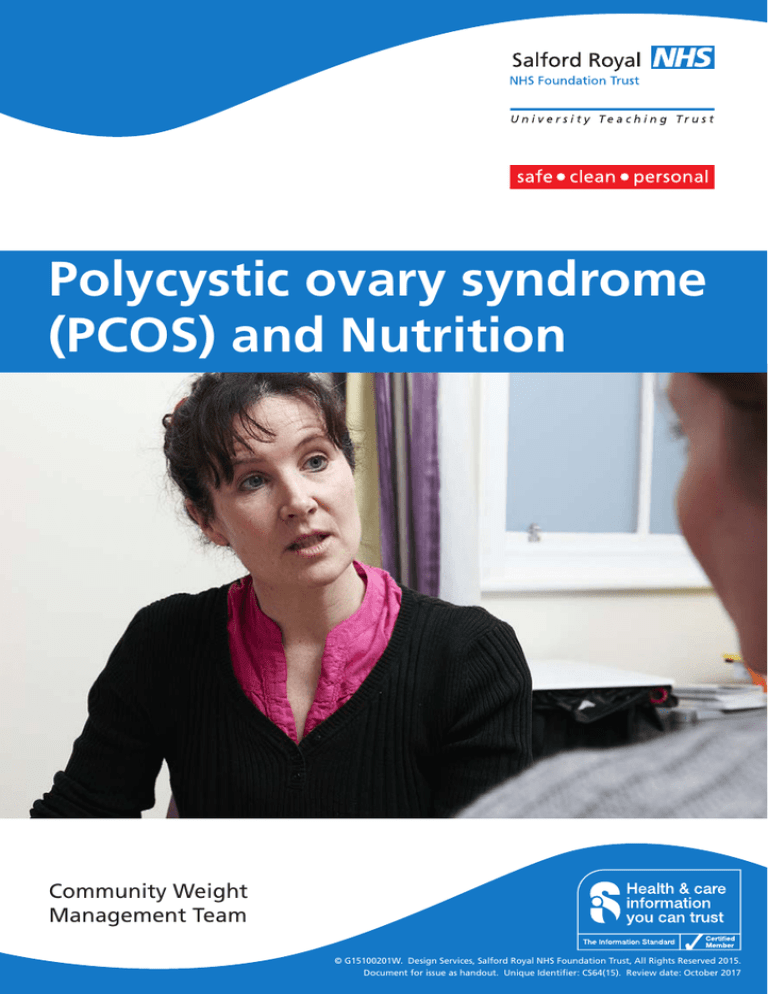
Polycystic ovary syndrome
(PCOS) and Nutrition
Community Weight
Management Team
© G15100201W. Design Services, Salford Royal NHS Foundation Trust, All Rights Reserved 2015.
Document for issue as handout. Unique Identifier: CS64(15). Review date: October 2017
The symptoms of
PCOS are caused by
imbalances in hormones
and insulin resistance.
What is insulin?
Insulin is a hormone. It helps
the body to use sugar as energy.
What is insulin resistance?
Insulin resistance happens when
the body does not respond to
insulin properly. When this
happens, the body produces
more insulin to compensate.
This causes the level of insulin
in the blood to become higher
than normal.
A high amount of insulin in
the blood may make it a little
harder to lose weight (however,
weight loss is not impossible).
It also increases the level of
testosterone in the blood.
Testosterone is a hormone
which naturally occurs in small
amounts in all women. But in
people with PCOS, testosterone
levels are higher than normal
due to insulin resistance.
High levels of testosterone
in the blood cause symptoms
of excess hair, irregular
periods, acne, and difficulty in
conceiving.
Insulin resistance becomes
worse when we gain weight, or
are over weight.
1
Body not responding to insulin
properly
Body produces more insulin
to compensate
Weight gain
Higher levels of insulin
in the blood
May encourage fat storage and
increase cravings for sweet foods
More testosterone produced
Symptoms: Excess hair, acne, irregular
periods, difficulty in conceiving
weight = insulin resistance = PCOS symptoms
weight = insulin resistance = PCOS symptoms
Insulin resistance can be
made worse by:
Insulin resistance can be improved by:
l Poor diet
l Regular exercise
l Lack of exercise
lSmoking
l Eating a healthy diet and
following a regular meal pattern
l Carrying excess weight
around your waist
l Choosing lower GI foods where
possible (see page 6)
l Losing weight
REMEMBER: Just losing 5% of your
weight can improve symptoms of PCOS
© G15100201W. Design Services, Salford Royal NHS Foundation Trust,
All Rights Reserved 2015. Document for issue as handout.
Unique Identifier: CS64(15). Review date: October 2017
2
Other health problems
Having PCOS means that you
are at higher risk of developing
heart disease, diabetes and
some forms of cancer. Losing
weight and making simple
changes to your lifestyle can
reduce your risk.
So what can I do to lose
weight, manage my PCOS
symptoms, and reduce my
risk of developing other
health problems?
l Eat regularly - never skip
meals. Aim to have 3 regular
meals per day with low kcal
snacks in between if required
l Aim to have a small amount
of starchy foods such as
bread, potatoes, pasta, rice,
breakfast cereals at every
meal. Try to opt for low GI
options where possible (see
page 6)
l Aim to eat 5 portions of fruit
and vegetables per day
3
Low Glycaemic index (GI) Foods
l Drink plenty of low kcal fluids
l Ensure portion sizes are
appropriate
l Limit high fat high sugar
food and drink
l Keep alcohol intake to a
minimum as it is high in
calories
Don’t forget exercise!
There is a wealth of evidence to
support the benefits of physical
activity in people with PCOS
including: helping to reduce
insulin resistance, helping
achieve weight loss, improving
mood, protecting against
developing diabetes and heart
disease.
If you don’t do much exercise
currently, remember - any
exercise which is more than you
would normally do is a great
start.
l GI is a measure of how
quickly starchy carbohydrate
(i.e. bread, potatoes,
pasta, rice, grains, noodles,
breakfast cereal) is broken
down into sugar and
absorbed by the body
l All types of beans, lentils,
chickpeas and pulses have a
low GI
l A starchy carbohydrate that
is classed as low GI means it
is broken down into sugar
slowly. This means your
blood sugar levels are less
likely to rise and fall sharply
l Limit sugary food and
drink such as sweets, cake,
sweet biscuits, fizzy drinks,
chocolate etc
l It is not necessary to limit
any fruit and vegetables
as long as you control your
portion size
l Pure fruit juices are high
in natural sugar and are
therefore high in GI. Drink
no more than 1x small glass
per day
l Low GI does not mean that
the food is low in calories or
fat
l Adding protein or fat to a
carbohydrate will slow down
its absorption e.g. adding
tuna or beans to a baked
potato (high GI) will result in
a medium GI meal
l Don’t add sugar to hot drinks
or food. Opt for sweeteners
instead
l Alcohol can increase blood
sugar levels if drunk in large
quantities. Sugary alcoholic
drinks such as cocktails, or
drinks with sugary mixers
(fizzy pop, fruit juice etc) will
increase blood sugars even in
small amounts
© G15100201W. Design Services, Salford Royal NHS Foundation Trust,
All Rights Reserved 2015. Document for issue as handout.
Unique Identifier: CS64(15). Review date: October 2017
4
*Foods high in calories therefore should be limited if you are trying to lose weight
Food
OK
Better
Best
Bread
High fibre white
Wholemeal
White
Bagels
Baguette
Pitta bread
Croissant, plain*
Crumpets
Poppadum
Rye bread
Mixed grain e.g. granary/multigrain
Pumpernickel
Chapattis
Fruit loaf/Raisin bread
Sourdough
French fries*
Mashed
Baked/microwaved
Instant
New potatoes
Potato crisps*
Sweet potato
Yam
Roast potato*
Potatoes
Pasta
Rice and
other grains
Instant rice
White/brown rice
Millet
Tapioca
Semolina
Noodles
Basmatic rice, white
Cous cous
Taco shells
Gnocchi
Rice noodles
Breakfast
cereal
Rice crispies
Special K
Muesli
Cornflakes
Granola
Weetabix
Puffed wheat
Coco pops
Bran flakes
Instant porridge, made with water
Ice cream*
Milk and
dairy
Biscuits and
crackers
Rice cakes
Plain scone*
Ryvita
Arrowroot biscuits*
Plain scone
Most pasta
Ravioli, meat filled
Basmatic rice, brown
Bulgar wheat
Pearl barley
Quinoa
Buckwheat
Noodles
Vermicelli
All Bran
Porridge oats made with milk
Meal and Snack Ideas
Low GI Midday meal ideas:
Use herbs and spices freely to
flavour your food. These will
not affect GI or calorie intake.
lJacket potato and salad with
nTuna mixed with low fat
mayonaise
nBaked beans
Low GI Breakfast ideas:
lBaked beans on 2x slices
of toasted multi-grain /
pumpernickel / granary bread
lPorridge made with semi
skimmed milk
lLow fat soup made with
beans or lentils with 2x
slices of toasted multigrain /
pumpernickel / granary bread
lAll bran with semi skimmed
milk
l2x slices of toasted multigrain / pumpernickel /
granary bread with low fat
spread
lBaked beans or poached eggs
on 1x slices of toasted multigrain /pumpernickel / granary
bread
lTuna or chicken with salad
and low fat salad dressing
with 1x wholemeal pitta
bread
lBrown rice and dahl
Milk and soya milk
Low fat yoghurt
Full fat yoghurt*
Rich tea biscuits
Oatmeal biscuits
Digestive biscuits*
For more information regarding low GI foods, visit: www.glycemicindex.com
5
© G15100201W. Design Services, Salford Royal NHS Foundation Trust,
All Rights Reserved 2015. Document for issue as handout.
Unique Identifier: CS64(15). Review date: October 2017
6
Low GI evening meal ideas:
Low GI snack ideas::
Please contact us on:
lFish or chicken with new
potatoes or sweet potato and
vegetables
l2x rich tea biscuits
Weight Management Dietitians
lChicken or fish or sea food
with brown pasta and
tomato based pasta sauce
with extra vegetables
lChilli con carne made with
beans and vegetables (with
or without meat) with brown
rice
lStir fry chicken or fish with
vegetables and noodles
l1x toasted multi-grain/
pumpernickel/granary bread
with low fat spread
l2x ryvita with:
nSliced boiled egg
nLean slice of cooked meat
nLow fat houmous
nCottage cheese / low fat
cheese spread
lLow fat yoghurt
l Small handful of unsalted nuts
lFish or chicken with brown
rice and vegetables or salad
l1x slice of fruit loaf or raisin
bread with or without low fat
spread
lBrown rice OR chapattis with
tomato based curry
l1x portion of fruit:
n1 apple / 1 orange / 1 pear /
1 small banana / 1 peach
n2 plums / 2 kiwi
Useful websites
0161 206 1223
Weight Management Dietitians,
Department of Nutrition and
Dietetics,
Salford Royal NHS Foundation Trust,
Stott Lane,
Salford, M6 8HD
www.verity-pcos.org.uk
www.nhs.uk/Conditions/
Polycystic-ovarian-syndrome
www.glycemicindex.com
Notes
weightmanagement@srft.nhs.uk
Weight Management Team
0161 206 6000
Weight Management Team,
Salford Community Health,
Sandringham House,
Windsor Street,
Salford, M5 4DG
healthwise@salford.nhs.uk
n7 strawberries
n10 grapes
n15 cherries
n1 inch slice of melon
Pure fruit juice - limit to 1x small
glass per day (approx. 150mls)
7
© G15100201W. Design Services, Salford Royal NHS Foundation Trust,
All Rights Reserved 2015. Document for issue as handout.
Unique Identifier: CS64(15). Review date: October 2017
8
© G15100201W. Design Services
Salford Royal NHS Foundation Trust
All Rights Reserved 2015
This document MUST NOT be photocopied
Information Leaflet Control Policy:
Unique Identifier: CS64(15)
Review Date: October 2017
For further information on this leaflet, it’s references and sources
used, please contact 0161 206 1223
If you need this interpreting please telephone
Copies of this information are
available in other languages
and formats upon request.
In accordance with the
Equality Act we will make
‘reasonable adjustments’
to enable individuals with
disabilities, to access this
treatment / service.
Email: InterpretationandTrans@srft.nhs.uk
Salford Royal operates a smoke-free policy.
For advice on stopping smoking contact the Hospital Specialist Stop Smoking Service
on 0161 206 1779
Salford Royal NHS Foundation Trust
Stott Lane, Salford,
Manchester,
M6 8HD
If you would
like to become a
Foundation Trust
Member please visit:
If you have any suggestions
as to how this document
could be improved in the
future then please visit:
Telephone 0161 789 7373
www.srft.nhs.uk/
for-members
http://www.srft.nhs.uk/
for-patients
www.srft.nhs.uk


